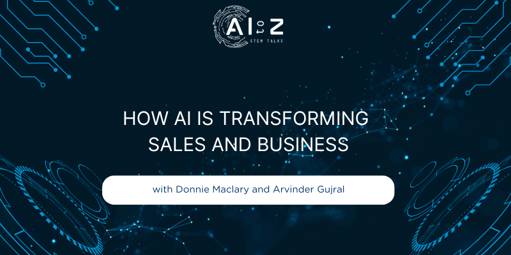
By
Matthew Hearfield
January 21, 2025
Updated
January 21, 2025
In this episode of the AI to Z Podcast, Donnie Maclary speaks with Arvinder Gujral, Chief Revenue Officer at EnableX, about the evolving intersection of artificial intelligence and sales strategy. With over 25 years of global expertise spanning India, California, and Singapore, Arvinder offers a grounded perspective on how AI is redefining business practices while emphasising the enduring importance of human connections in sales.

The conversation explores how organisations can harness AI’s capabilities without losing the human touch that drives trust and long-term client relationships. Arvinder also shares insights from his investments in AI-focused startups, underlining where the technology is headed and how businesses can adapt.
Listen to the full episode below:
The role of AI in sales transformation
Instead of writing a cold email to an Arvinder without really knowing much, you can use an AI tool to know a lot about me from my activities on the internet and write a very custom email or LinkedIn outreach to me in the language in which I like to receive information.
Arvinder Gujral highlights how AI tools are being used to gather buyer insights, create personalised outreach, and eliminate redundant tasks, allowing sales professionals to focus on higher-value interactions. AI tools can now assist in identifying potential leads more effectively by analysing data patterns and automating repetitive tasks.
AI can also enable tailored communication by leveraging buyer intelligence, increasing the likelihood of engagement. Tasks traditionally requiring hours of manual effort, such as researching a buyer's preferences or drafting personalised emails, can now be handled by AI in minutes.
AI in marketing and lead generation
You can actually have AI optimise the spend on the platform, and you can see which one is getting the most clicks, which one is getting the most qualified clicks, which of these qualified clicks are moving to a sales-accepted lead down the funnel.
AI is transforming marketing and lead generation by streamlining processes like content creation and campaign optimisation. Tools powered by AI can generate numerous ad and video copy variations, enabling marketers to perform extensive A/B testing and refine messaging for maximum impact.
This automation significantly reduces the time and costs associated with traditional copywriting while enhancing the precision of targeting efforts. By analysing vast amounts of data, AI identifies high-potential leads, ensuring that marketing resources are directed at the most relevant audiences. Platforms like HubSpot and Clary leverage AI to analyse campaign performance in real-time, providing actionable insights that improve conversion rates and overall ROI.
Human element in sales
Humans buy from humans. Machines are not buying from a machine. You will want to hold someone accountable on the client’s and the vendor’s side
The importance of the human element in sales remains critical despite AI's ability to streamline processes and optimise workflows. While AI effectively handles tasks such as lead generation, personalised outreach, and data analysis, the ultimate decision-making and relationship-building still require human judgment.
Arvinder Gujral discusses how buyers prefer to interact with humans, as trust and accountability are central to the sales process. AI enhances efficiency by freeing up time for sales professionals to focus on meaningful interactions, but it cannot replace the nuanced understanding and personal connections that humans bring to the table.
Future of AI in business applications
The future of AI in business applications lies in its ability to create value through practical use cases rather than merely focusing on infrastructure. While foundational layers such as data processing, model development, and infrastructure are vital, the real potential of AI emerges when these tools are applied to solve specific problems and generate revenue.
Arvinder Gujral likens AI applications to how electricity grids are essential but derive their true value from the appliances they power, like refrigerators and microwaves. Similarly, AI's success will be measured by its ability to address real-world challenges and offer solutions that businesses can monetise.
Balancing hype and practicality
Yes, there will be a hype cycle... but I believe this hype will fructify into something real across multiple layers
The current surge of investment in AI is accompanied by scepticism regarding its ROI and practical applications, highlighting the need to balance innovation with realistic expectations. While AI is heralded as a transformative technology, many question the disparity between the billions invested and the revenue generated so far.
Arvinder Gujral acknowledges the presence of a hype cycle typical of any new tech wave but remains optimistic about AI’s potential to evolve into meaningful, revenue-generating applications.
Key takeaways
- The role of AI in sales transformation: AI is revolutionizing sales by optimizing time-intensive processes like lead generation, ad copy creation, and personalized outreach.
- AI in marketing and lead generation: AI generates multiple ad and video copy variations for A/B testing, improving ROI on marketing campaigns.
- Human element in sales: Despite AI's automation capabilities, human interaction remains pivotal in sales, particularly for building trust and addressing nuanced client needs.
- Future of AI in business applications: AI's true potential lies in applications rather than infrastructure, with significant revenue opportunities emerging from AI-driven solutions tailored to user needs.
- Balancing hype and practicality: The current AI investment surge is tempered by skepticism about ROI, with discussions on its sustainable integration across industries.
Article and quotes have been edited for brevity and clarity.
